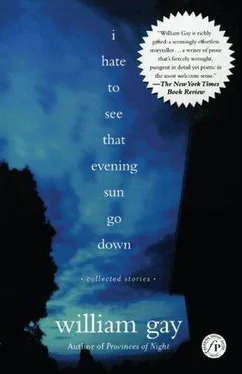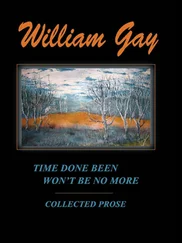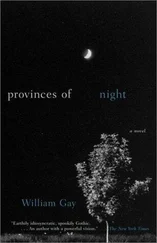She said she loved him and he had no cause to doubt it. They were like a drug in each other’s veins. A crazy bad-news drug, their hands trembled with the hypo, the needle prodded for an uncollapsed vein. The drug they used was rare and dangerous with unknown and catastrophic side effects — you couldn’t buy it, it had to be stolen under cover of darkness when other folks were asleep or their attention had wandered.
If he didn’t call or if he made no effort to see her, she came to see about him. She always seemed a little harried, almost distraught, glad to see him still there. It was as if she expected to see the house open to the winds and him gone without a trace or a word of farewell, gone to Africa to search for diamond mines or to South America to save souls. But Worrel had given up on prospecting and had come to feel each soul responsible for its own salvation and he was always there. In bed she’d cling to him and call his name as if she were trying to call him back from the edge of something. Warn him.
There had been a time when she was going to leave Hollis for him but the violence of his own recent divorce had sobered her, given her pause. There were other lives to be considered. Hollis had said in no uncertain terms there would be a custody battle. She was not in a good position for one. Hollis was in an excellent position. He was a good provider and a steady worker, and he was also faithful, or at least discreet. Angie and Worrel had started out careful and discreet but the power of the drug had surprised them and things had gotten out of hand: at some point, like drunken teenagers trashing a house, they had kicked down the doors and smashed the windows and sprayed their names on the wails in ten-foot-tall graffiti.
Everything fled from Worrel in the aftermath. Everything: house and car and vindictive wife. Disaffected and disgusted children fleeing at a dizzying pace like animals scuttling out of the woods from the mother of all forest fires, little scorched and smoking Bambis and Thumpers hell-bent for elsewhere, and Worrel himself seized in the soft grasp of her flesh scarcely noticing.
He studied her profile against the shifting woods of late-winter sunlight, a little stunned at the price he had paid for so tenuous and fragile a portion of her life, though he never doubted she was worth it.
THEY WERE DRIVING out of Ackerman’s Field and nearing Nashville when she glanced over at him. Did you find a place yet? she asked.
Since the affair had begun Worrel had become an addict of shading and nuance, decoding her speech as if there were always hidden meanings. What she’d asked could have meant, Haveyou found a place for me and the kids? or it could have meant, Have you found a place we can be without your ex-wife coming and screaming at us? But it did not mean either of those things. All it meant was, Have you found a place? and he discarded it.
I may move in with you and Hollis, he said.
She glanced from the road to him, half a smile, half a grimace. It’s not funny, she said. When are you going to stop treating everything as if it were a joke?
Maybe when everything stops being a goddamned joke, he said.
The last of the traffic lights had fallen away now and she didn’t need her right hand for shifting, so she reached and grasped his left, pulling it over to the console between them. Her hand uppermost, her fingers laced with his. She squeezed it hard, then just drove clasping it loosely, her fingers calm and cool against his own. There was something oddly comforting about it, and Angie seemed to feel it as well, for climbing into the hills where perhaps she should have downshifted, she just drove on, the transmission laboring and vibrating until they’d made the grade.
If you need your hand to drive just take it back, he said.
She smiled at him, her face an enigma behind the dark glasses. My hand is just fine where it is, she said.
He turned away and looked at the countryside, aware of the scarcely perceptible weight of her hand, and watched Tennessee roll up — bleak trees, buttercups on the shoulder of the road, the leached funeral silks of winter, the cusp of promised spring the world hung on to.
They had been friends before they had been anything else and they could talk or they could ride in comfortable silence. Mostly they rode in silence, Worrel’s mind turning up images of her as you’d turn up pages in an album of photographs and, in the one he looked at most, her eyes looked as they did in the moment before he kissed her the first time. He’d known he was going to and was glad he’d waited until her eyes looked the way they had. As if they’d been simultaneously asking and answering a question. They’d stepped together and Worrel felt as if she’d slammed against his chest, as if they’d stepped onto some narrow ledge of unreckonable height. Looking down made you dizzy and you might plummet later in the next second, though not now; now seemed not only enough but all there was. Later there were other kisses: in hallways, in the moment before a closed door opened, in the moment between the wash of headlights on a wall and the slam of a car door, in the moment when footfalls announced someone was coming but he wasn’t here yet. In these tawdry moments are worlds, universes.
The night before they went to the motel for the first time she twisted his mouth down to hers and said against his teeth, I think you’re trying to corrupt me. He didn’t deny it.
♦ ♦ ♦
IT WAS SEVENTY MILES to Nashville and today it seemed too short a distance. After a while they joined the insectlike moil of traffic and she needed her hand back. She was a good driver, effortless, unpressured, and she didn’t even have to look for street signs to find the medical center. She’d been there before.
In the thin watery light, the Athens of the South perched atop its hills like something from a dream. The red Blazer went through the narrow canyons between the buildings with ten thousand other red Blazers negotiating the narrow canyons and everything began to look unreal.
The pale transparent light off the facades of the buildings imbued them with meaning so that they looked to Worrel like monuments erected and fled by some prior race finer than the present folk who milled about like maggots working in flesh.
She parked in front of the medical center and they got out. She looked at her watch. We don’t have time for lunch before my appointment, she said. Do you mind waiting until we get through here?
Of course not, he said. I’m not even hungry.
Well, she said, uncertain, looking at the building.
They walked toward it. The marble veneer glittered in the sun. It looked like an enormous mausoleum. The statuary on the lawn looked like relics replevied from a tomb so long hidden from the daylight that the thought of time and its unspooling made Worrel dizzy.
HE SAT IN THE WAITING AREA with a roomful of other people. Nothing looked right. Maybe he was coming down with something. The pictures on the wall were wrong. A Dali print, a Bosch. Watches melted, marvelously detailed folk were flared. The pictures seemed part of some surreal scheme to acclimate him to the horror to come.
The people did not seem right either. Everything about them rang false, even their clothing seemed strange, either years out of style or years ahead of its time. When they spoke some of the voices were pitched too high, others dragged endlessly like audio-tape moving slower and slower. Their emotions were out of sync, their anxiety too hyper, their stoicism simply cold indifference.
She’d left her purse for him to mind and dangling it by the strap he went outside and smoked a cigarette. He seldom left the country and his eyes were drawn almost against his will to the jumbled skyscrapers and high-rise apartments. Everything seemed leaned toward some common center, the hazy pastel buildings collapsing on themselves. In the sepia light the city looked as strange as some fabled ruin on the continent of Lemuria.
Читать дальше












